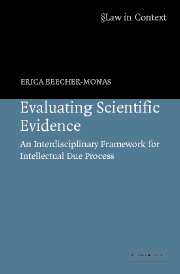Book contents
- Frontmatter
- Contents
- Acknowledgments
- Evaluating Scientific Evidence
- Introduction
- 1 Triers of science
- 2 What is intellectual due process?
- 3 A framework of analysis
- 4 Toxic torts and the causation conundrum
- 5 Criminal identification evidence
- 6 Future dangerousness testimony: The epistemology of prediction
- 7 Barefoot or Daubert? A cognitive perspective on vetting future dangerousness testimony
- 8 Future dangerousness and sexual offenders
- 9 Models of rationality: Evaluating social psychology
- 10 Evaluating battered woman syndrome
- Conclusion
- Index
- The Law in Context Series
2 - What is intellectual due process?
Published online by Cambridge University Press: 04 December 2009
- Frontmatter
- Contents
- Acknowledgments
- Evaluating Scientific Evidence
- Introduction
- 1 Triers of science
- 2 What is intellectual due process?
- 3 A framework of analysis
- 4 Toxic torts and the causation conundrum
- 5 Criminal identification evidence
- 6 Future dangerousness testimony: The epistemology of prediction
- 7 Barefoot or Daubert? A cognitive perspective on vetting future dangerousness testimony
- 8 Future dangerousness and sexual offenders
- 9 Models of rationality: Evaluating social psychology
- 10 Evaluating battered woman syndrome
- Conclusion
- Index
- The Law in Context Series
Summary
The rule of law is often described as a search for truth in a system that aspires to rationality. The rule of law is also conceived as a vital safeguard from the paradox of freedom in democracies, in which the strong – physically or economically – if not restrained from preying on the weak, defeat the freedom that enabled them. An integral component of this vision is – at least in the United States and for criminal trials elsewhere in the former Commonwealth countries – the jury. The jury system, which provides a structure for citizen participation and brings the voice of the community into the process of legal decision making, is a key feature of the separation of powers doctrine. At the same time, the bifurcation of decision-making duties between judge and jury has consequences, a primary one being the restriction on the information that the jury will be given and able to use for its determination.
One hotly debated area in this bifurcation has been the use of expert witnesses and the necessity of judicial screening for validity of the expert's science before permitting experts to testify. For scientific evidence, the question now is whether the testimony has met the standards and methods of science. Even in state courts that have eschewed the Daubert standard in favor of the old general acceptance rule, there is increased concern with scientific validity.
- Type
- Chapter
- Information
- Evaluating Scientific EvidenceAn Interdisciplinary Framework for Intellectual Due Process, pp. 17 - 35Publisher: Cambridge University PressPrint publication year: 2006

